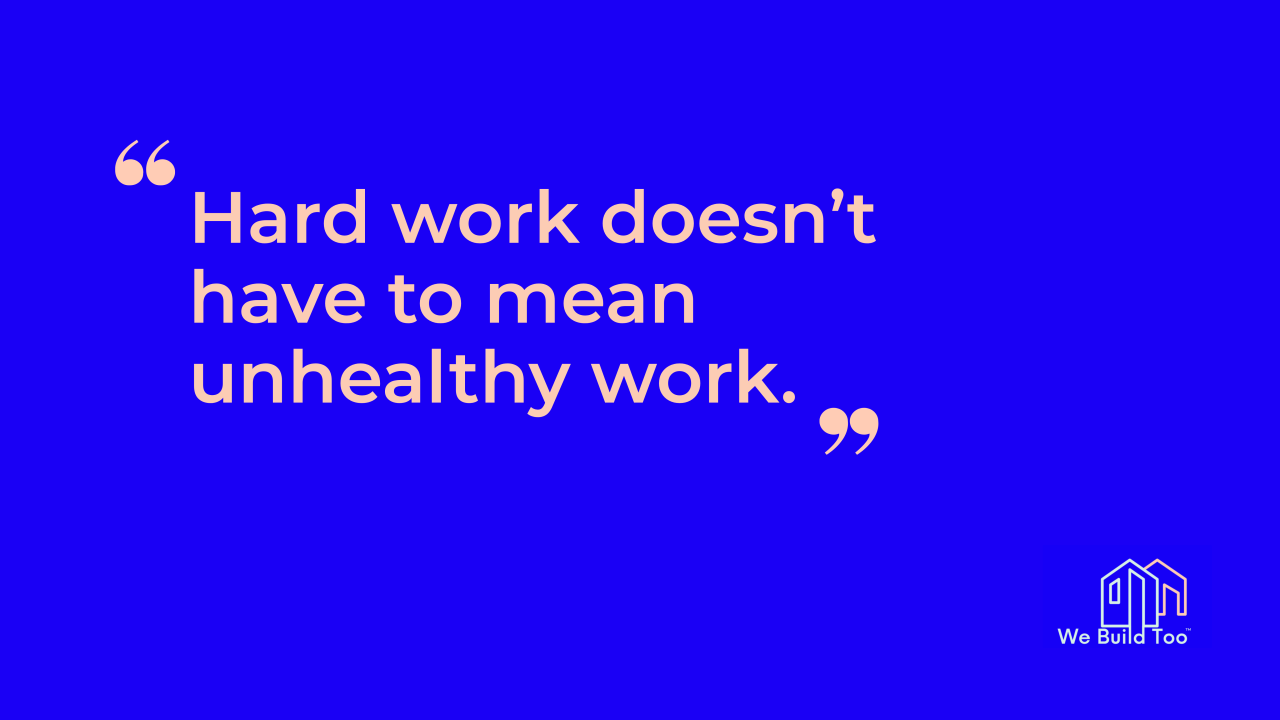
Rethinking how we build businesses
Anna - Founder
April 2, 2025
I’m building We Build Too, a platform designed to empower women in construction.
This isn't just about designing services for tradeswomen and customers—it's also about shaping the organisation that will deliver them.
Having grown and led multidisciplinary teams across complex projects, I’ve learned a lot about what works—and what doesn’t. I’ve also followed the journeys of many founders and seen how company culture is often shaped, for better or worse, by the way businesses are built from the start.
One of the biggest lessons? The way we work matters.
Breaking the “Always-on” founder mentality
When I talk about my vision for building We Build Too, people often tell me the same thing:
"You'll have to work all hours of the day."
"No breaks, no time off—you’ll need to take meetings at 5 AM."
It’s almost like a badge of honor, this idea that success means sacrificing everything. But with 62% of workers fearing burnout in 2025, and 54% of startup founders experiencing burnout in the past 12 months it's clear that this assumed way of working is damaging.
And this mindset doesn't just affect founders—it sets the tone for the entire organisation. It creates a culture of stress, overextension, and burnout, which isn’t good for employees, customers, or the long-term success of a business.
I’m not naïve. I know building a business is hard work. But hard work doesn’t have to mean unhealthy work.
If we don’t challenge outdated patterns, they will never change. And that means the same people will stay in power, the same biases will persist, and the same barriers will exist for women in construction.
The case for flexible work in construction
A study by Timewise found that introducing flexible working led to a 75% increase in workers who felt they had enough time to look after their health and well-being, jumping from 48% to 84%. Notably, productivity and deadlines were not negatively affected.
A 2023 report by AXA UK estimated that work-related stress and burnout cost the UK economy £28 billion annually through absenteeism, reduced productivity, and other factors.
A separate study found that work-life balance has a 95.2% influence on employee creativity—which is critical for problem-solving, innovation, and delivering high-quality work.
Flexible work is possible in construction
Construction has long been seen as an industry where flexible working isn’t possible. But that’s simply not true. Yes, construction faces unique challenges. But solutions exist:
Staggered shifts – Managing on-site requirements while allowing for flexibility.
Remote work for admin roles – Many planning and management tasks can be done off-site.
Technology adoption – Digital collaboration tools make remote and flexible work feasible.
Emma Stewart, Director of Development at Timewise, puts it best:
"Well-being and balance should be possible to achieve for the whole workforce – not just those in office roles."
What this means for We Build Too
I want to build a business that challenges the norm. That means:
Less rigid, more outcome-focused work – For both employees and myself as a founder.
Boundaries and efficiency – Working hard, but in a healthy, sustainable way.
A culture of balance, not burnout – Because creativity, productivity, and retention thrive when people aren’t exhausted.
Leading by example
As a founder, I know the culture I set from day one will shape We Build Too in the long run. By building with intention—prioritising both outcomes and well-being—I’m not just creating a platform. I’m helping to change an industry.
Because if we want to see real change in construction, we have to build differently.
What do you think? Have you seen flexible work practices succeed in start ups, construction or other industries? Let’s start the conversation.
